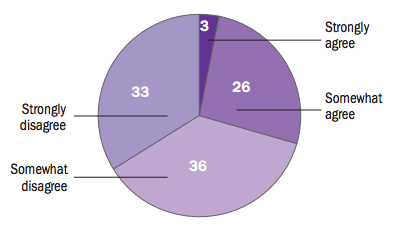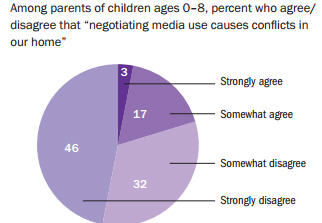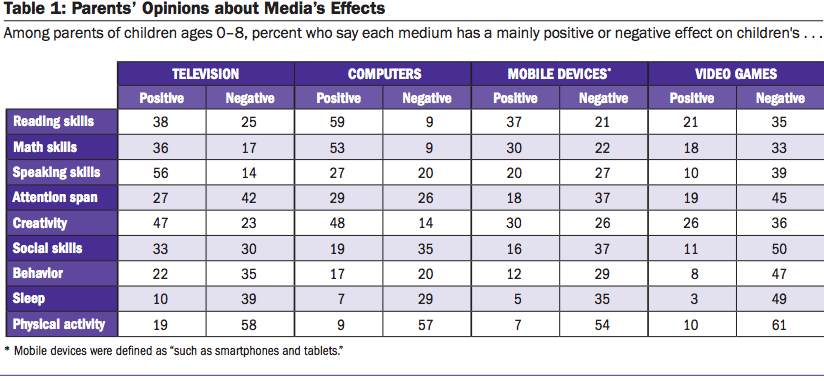The Parents Are Alright About Young Children’s Use of Media
A survey of 2,300 parents of children between birth and eight years of age found that "Parents do not report having many family conflicts or concerns about their children’s media use with 78% disagreeing with the statement, “negotiating media use causes conflicts in our home.” Twenty percent agree with that statement.
The study also found that parents "do not report significant conflicts with their spouses over their children's media use." More than eight in ten (83%) married parents say they usually agree with each other about tech use, while 16% do not.
These findings are from a report from the Center on Media and Human Development at Northwestern University, titled Parenting in the Digital Age: A National Survey by Ellen Wartella, Vicky Rideout, Alexis Lauricella and Sabrina Connell. Most parents not concerned While 56% of parents say they are not concerned about their children's use of media, only about a third say they are very: (13%) or somewhat (17%) concerned.
The study found that, even though many parents are equipped with smartphones (70%) and tablets (42%), “the vast majority of parents (70%) “do not think the devices make parenting easier, compared to 29% who say they do.” Thirty eight percent of parents who own both a smartphone and a tablet say the devices do make parenting easier.

Among parents of 0–8 year-olds, percent who agree/
disagree that “smartphones and tablet devices make all
parenting easier”
Putting media use concern into perspective
The researchers asked parents to rate various concerns they have about their children and, when it come to media use, only 31% said they were “very” or “somewhat” concerned. Media use came in sixth place behind Health and safety (45%), fitness and nutrition (41%), social and emotional skills (39%), school performance (33%) and literacy skills (32%). I might add that media use actually impacts several of those other concerns.
Interactive tech not being used to babysit
The study also found that while parents do use technology to manage daily life “books, toys, and other activities are used more often.” And most parents aren’t using technology as an electronic baby sitter. “Parents say they are more likely to use books, toys, and other activities when they need to keep children occupied than they are to use TV; and they are much more likely to use TV than to use mobile media devices.”
And when it comes to young children, it’s common for parents and children to use technology together. Nearly a third of parents say that when their child is watching TV (32%), using the computer (29%), or playing on a smartphone (29%), the parent is watching or playing along with them “all or most” of the time.
Parents do worry about the impact of technology on their kids physical activity. Sixty-one percent of parents say video games have mainly a negative effect on physical activity compared to 58% who say that about TV, 57% about computers and 54% about mobile devices.
Positive about media use
Parents were more positive than negative about the affect of media on their children’s academic skills. On reading skills, 38% were positive about TV compared to 25% who were negative. Computers fared better with 59% positive and only 9% negative. Parents were less enthusiastic about mobile devices (37% positive and 21% negative) while video games came in at 21% positive and 35% negative.
My take
My interpretation of this survey is summed up by the title of this post. For the most part, parents are “alright” about how their young children are using media. Personally I think that’s real progress. Over the past few years we’ve had a steady diet of moral panics from media, politicians and some scholars over the “dangers” of too much media. The American Academy of Pediatrics has recommended zero screen time for children under two and less than two hours a day for older kids and, in its policy, lumps “TV and other media use” into a single category as if the actual activity or program doesn’t matter. While it’s hard to quarrel with the AAP’s conclusion that “children need positive interaction with other children and adults,” that doesn’t necessarily mean that they can’t benefit from use of electronic media as well. From the looks of this survey, it appears that parents are being smart and understanding that — in moderation — watching appropriate TV shows and interacting with apps and devices can be a positive part of early childhood activity.
For more about this study, see my ConnectSafetly.org co-director’s post, Parenting the littlest media users: Important study


